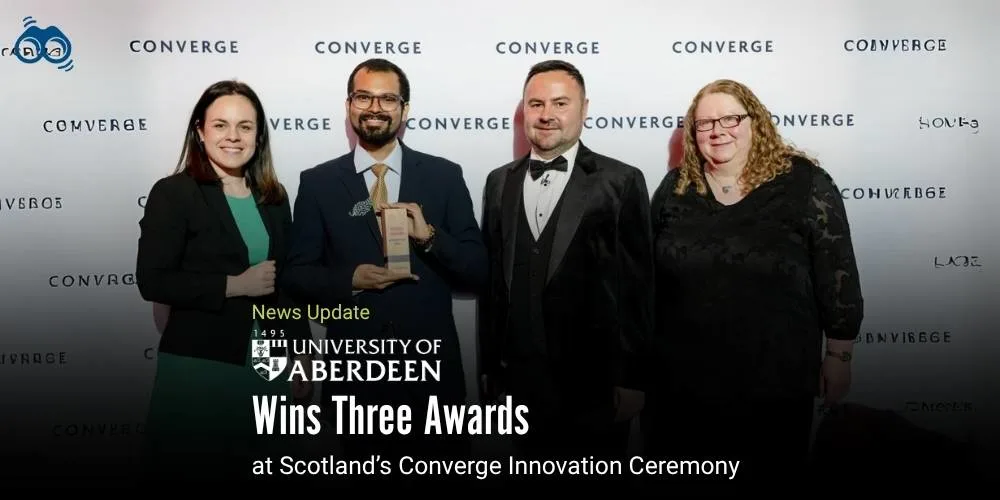Aberdeen Leads Scotland’s Academic Innovation at Converge Awards 2025
Scottish Innovation Celebrated as Aberdeen Projects Secure Top Honours
The University of Aberdeen received significant recognition at this year's Converge Awards in Edinburgh on October 2nd. Hosted by Deputy First Minister Kate Forbes, the ceremony celebrated Scotland's most innovative university ideas, distributing over £400,000 across 22 prizes.
University of Aberdeen research projects secured three awards, showcasing the institution's strength in academic research and innovation. PhD researcher Jani Shibuya was particularly successful, earning two accolades. She was named runner-up in the Net Zero competition, receiving £10,000 and business guidance from SSE. Additionally, her business, Hychor, was one of two recipients of the Blue Economy Awards, worth £17,500. Hydrochor's innovative technology directly generates hydrogen from seawater, eliminating the need for desalination. This method promises a more affordable and accessible way to produce hydrogen, especially in coastal regions, thus supporting the global shift away from fossil fuels.
Furthermore, graduate Soham Mitra was awarded a KickStart Challenge runner-up award of £7,500 for his activity with CAnswer Biosolutions. His team is developing a biopsy kit that can be taken out of the hospital and used to test for cancer. The device is under £50, significantly less than existing ones, and contains sample collection and safe transportation tools. This product may have the potential to alleviate lengthy NHS waiting lists and enhance access to cancer diagnosis, particularly with skin cancers remaining on the increase globally.
The news was announced after Converge confirmed its biggest-ever funding deal, £1.26 million from the Scottish Funding Council over three years. A new strategic partnership with Scottish Enterprise was also unveiled, designed to assist Scotland university researchers and entrepreneurs in developing their ideas into successful businesses. Adam Kosterka, executive director of Converge, said that the winners this year demonstrated what was possible when talented minds in UK university environments were provided with the appropriate support and networks. He highlighted that the programme was laying a robust platform for business research and innovation, connecting ideas from the lab to the marketplace.
Deputy First Minister Kate Forbes further said that the additional finance and new partnership would bolster backing for spin-outs, startups, and research institutions. She emphasised working through sectors to enable university entrepreneurs to develop and thrive.
Converge has backed more than 830 future founders since it was launched in 2011 and has gone on to develop over 450 businesses, many of which have demonstrated resilient survival rates. Open to students, graduates and staff, it provides business training, the expertise of expert mentors, and cash awards that are equity-free. It remains a pivotal part of university news and the broader creation of postgraduate degrees and research activity throughout Scotland.
Editor's Note
The success of the University of Aberdeen at this year's Converge Awards is unambiguous proof that academic research in Scotland is not merely flourishing, it's setting the standard for tackling real-world challenges. From renewable energy to cancer diagnosis, these projects reveal what the convergence of good ideas and practical backing, combined with robust partnership, can achieve. Jani Shibuya's hydrogen-from-seawater innovation is just the type of innovation we require in the net-zero race. It's smart, scalable, and driven by environmentalism. Soham Mitra's biopsy kit is just as remarkable, cost-effective, life-saving, and patient-centric. Both innovations demonstrate that research does not have to stay in journals; research must be in communities, clinics, and markets around the world. With new investment and strategic partnership secured, Converge is forging an even stronger link between Scotland's universities and the emerging economy. The University of Aberdeen is obviously leading the way, and it is heartening to see postgraduate qualifications and research institutions being valued not only for ideas, but for impact.
Skoobuzz believes that the University of Aberdeen’s achievements reflect the growing strength of Scotland’s academic innovation. As research continues to shape real-world solutions, its value to society becomes ever more evident.
FAQs
1. What is the Converge Innovation Ceremony in Scotland?
The Converge Innovation Ceremony is an annual event that celebrates the best new ideas coming out of universities across Scotland. It rewards students, graduates, and staff who are turning academic research into practical solutions, new businesses, and technologies. The ceremony includes cash prizes and support to help these ideas grow into successful companies.
2. Why did the University of Aberdeen win three awards?
The University of Aberdeen won three awards because its researchers presented strong, practical innovations that address global challenges. Their projects focused on clean energy and cancer diagnostics, two areas with major impact. The judges recognised the university’s ability to combine academic research with real-world problem-solving.
3. What are the winning research projects at Aberdeen University?
Aberdeen’s winning projects included:
Hychor, led by PhD student Jani Shibuya, which creates hydrogen directly from seawater without desalination. This helps reduce costs and supports clean energy.
A portable biopsy kit, developed by graduate Soham Mitra, which allows cancer testing outside hospitals. It’s affordable and designed to improve access to diagnostics, especially in areas with long waiting times.
Jani Shibuya also received a second award for her work in the Blue Economy category, showing the wider potential of her hydrogen technology.
4. How does Aberdeen University support innovation and entrepreneurship?
Aberdeen University supports innovation by encouraging students and researchers to develop business ideas from their academic work. It offers access to training, expert advice, and funding opportunities. Through programmes like Converge, the university helps people move from research to real-world impact, supporting both local and global needs.
5. What other universities participated in the Converge awards?
All 19 universities in Scotland took part in the Converge awards. These include major research institutions and newer universities across the country. The awards show how Scotland university networks are working together to support innovation, entrepreneurship, and academic excellence.














0 Comments (Please Login To Continue)